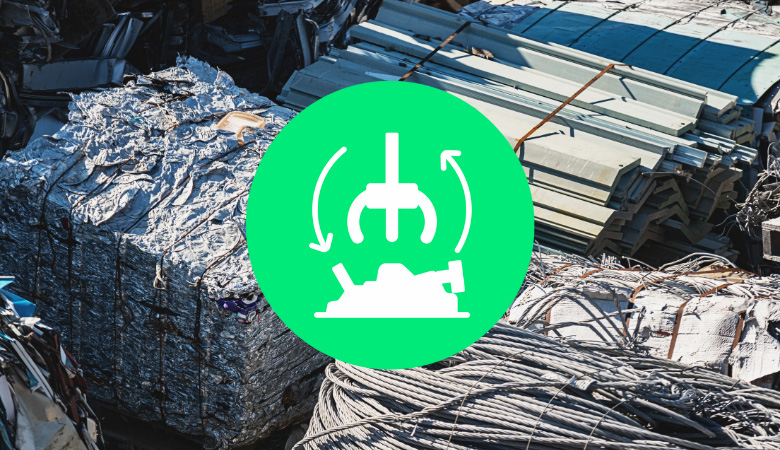Scrap Metal Inspections.
One man's scrap is another man's opportunity.
Get quotes to inspect Scrap Metal in port, before shipment anywhere in the world.
Get quotes for Scrap Metal Inspections!
Scrap metal inspections refer to the process of examining and assessing scrap metal materials for various purposes, including quality control, compliance with regulations, and determining the value of the metal.

These inspections are typically carried out by trained professionals, such as inspectors or experts in the field of scrap metal recycling or metallurgy.
The primary objectives of scrap metal inspections include:
Quality Control: Inspections help ensure that the scrap metal meets the required standards and specifications for its intended purpose. This involves verifying factors such as metal composition, purity, dimensions, and absence of contaminants or impurities.
Safety and Compliance: Inspections aim to ensure that the scrap metal being traded or processed complies with relevant safety and environmental regulations. This helps prevent the use or circulation of hazardous materials or substances that could pose risks to human health, safety, or the environment.
Valuation and Pricing: Inspections play a crucial role in determining the value of scrap metal. The inspection process assesses the quality, quantity, and condition of the materials, which can impact their market price. Inspectors may consider factors such as the metal type, grade, weight, and market demand to provide an accurate valuation.
During a scrap metal inspection, inspectors may perform various activities, such as:
Visual Inspection: Inspectors visually assess the appearance, condition, and cleanliness of the scrap metal to identify any visible issues, such as corrosion, damage, or foreign objects.
Sampling and Testing: Inspectors may collect samples of the scrap metal for further laboratory analysis. Testing methods can include chemical analysis, spectroscopy, X-ray fluorescence (XRF), or other techniques to determine the metal's composition and purity.
Documentation and Record-Keeping: Inspections involve maintaining accurate records of the inspection process, including documenting the inspection date, location, findings, and any relevant photographs or test results. These records may be required for regulatory compliance or business purposes.
It is important to note that scrap metal inspections can vary depending on the specific industry, regulations, and standards in different regions or countries. The inspections may be conducted by independent third-party inspectors or by internal quality control personnel within scrap metal recycling facilities, scrapyards, or manufacturing companies.
Here are some key aspects of scrap metal international trade regulations and standards:
Import and Export Controls: Countries often have specific import and export controls for scrap metal to regulate the flow of materials across their borders. These controls may include licensing requirements, documentation, customs procedures, and restrictions on certain types of scrap metals. Authorities typically monitor these imports and exports to ensure compliance with environmental and safety regulations.
Basel Convention: The Basel Convention on the Control of Transboundary Movements of Hazardous Wastes and Their Disposal is an international treaty that aims to regulate the transboundary movement of hazardous wastes, including certain categories of scrap metal. The convention sets guidelines for the environmentally sound management of such wastes and imposes restrictions on their export and import.
Quality Standards: Many countries have established quality standards or specifications for scrap metal imports, especially for materials intended for industrial use or recycling. These standards define parameters such as metal composition, impurity limits, size, weight, and packaging requirements. Compliance with these standards ensures the suitability and safety of the imported scrap metal for further processing.
Environmental and Safety Regulations: Scrap metal international trade is subject to various environmental and safety regulations. These regulations aim to prevent the import or export of hazardous or contaminated materials that may pose risks to human health, safety, or the environment. They may include restrictions on specific metals, substances, or processes that are considered harmful or polluting.
Certification and Documentation: To facilitate international trade, documentation and certification play a crucial role. Exporters and importers are typically required to provide accurate and complete documentation, such as bills of lading, certificates of origin, inspection certificates, and compliance statements. These documents help verify the origin, quality, and compliance of the scrap metal being traded.
Tariffs and Trade Barriers: Tariffs, duties, and trade barriers can impact the international trade of scrap metal. These measures are imposed by countries to protect domestic industries, regulate trade, or address economic factors. Importers and exporters need to be aware of these trade barriers and associated costs when engaging in scrap metal trade.
Get scrap metal inspection quotes anywhere in the world.
Why Choose Us
Global network of qualified inspectors
Only professional outfits are registered on our platform. Vetted and screened, so you don't get any nasty surprises when selecting your quality control provider!

Remote (Guided) inspections
Our inspectors are capable of receiving remote instruction, and guidance during specialized inspections. Ensuring that we meet required specifications.

You control the timeline
You have control over the timeline including the quote deadline, the inspection date and the date of the report. Allowing your inspections to seamlessly integrate into your logistics.







